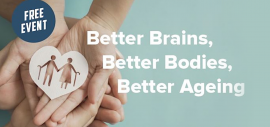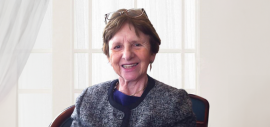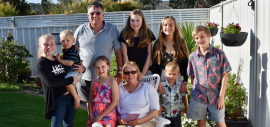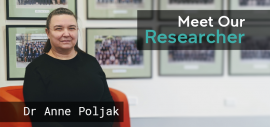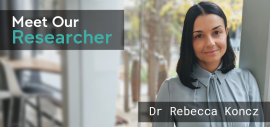Blog: The Brain Dialogues, filtered by tag: Alzheimer's Disease
Better Brains, Better Bodies, Better Ageing
HEIDI DOUGLASS | h.douglass@unsw.edu.au
More than 500 seniors filled the auditorium at The Juniors in Kingsford to discover the intrinsic links between their brains, bodies and better ageing. The annual event held on 25 October, was hosted by South Eastern Sydney Local Health District’s Older Persons’ Mental Health Service, in partnership with Randwick City Council and the Centre for Healthy Brain Ageing (CHeBA).
With people over the age of 65 now outweighing people under the age of 15, the theme of this year’s public event was Better Brains, Better Bodies Better Ageing, which enticed… Read More
Advocates for healthy ageing through Sydney Marathon
HEIDI DOUGLASS | h.douglass@unsw.edu.au
In a bid to address the escalating number of people living with dementia, PJ Lane - son of TV legend Don Lane – and four corporate teams took on this year’s Sydney Marathon, raising much needed dollars for dementia research while promoting the benefits of physical activity throughout life to reduce risk of dementia.
CHeBA Ambassador PJ Lane ran his first ever Marathon and led the charge as highest individual fundraiser with $9,279 raised for research.
Senior executives from Henry William Lawyers, Luna Partners, Integrated Portfolio Solutions and… Read More
Keys to Better Ageing: Free Seniors Event
HEIDI DOUGLASS | h.douglass@unsw.edu.au
The South Eastern Sydney Local Health District’s Older Persons’ Mental Health Service based at Prince of Wales Hospital, in partnership with Randwick City Council, is set to hold its annual forum for the senior community on Wednesday, 25 October, with this year’s theme ‘Better Brains, Better Bodies, Better Ageing’.
The free event, held from 10am to 1pm at The Juniors, Kingsford aligns with this year’s Alzheimer’s Disease International World Alzheimer’s Report message, that up to 40% of projected dementia cases could be delayed or avoided by addressing… Read More
A Tribute to Annette Murphy
HEIDI DOUGLASS | h.douglass@unsw.edu.au
In August 1932, a baby girl given the name Annette Barbara Murphy was born in Temora, New South Wales.
At age 90, following a 10-year battle with dementia, Annette passed away peacefully at Killara Gardens Aged Care.
Annette was a Piano Teacher, a lover of the arts and was blessed with a happy, fulfilling life and an adoring life partner who was with her for 57 years.
She was admired by her four children Jennifer, Peter, Debra and Justine, and a much-loved Ma-Ma to her eight grandchildren, Elliot, Lilly, Georgina, Anna, George, Julia, Aveline and… Read More
A Tribute to Jean Nesbitt
HEIDI DOUGLASS | h.douglass@unsw.edu.au
In 1945 when Australians were celebrating the end of the Second World War, a baby girl was born west of Sydney, in Granville. Her parents named her Jean.
65 years later and with three loving sons, seven grandchildren and more than 50 years of a strong and happy marriage to husband Len Nesbitt, Jean was diagnosed with vascular dementia – the second most common form of dementia after Alzheimer’s disease.
On Friday, 11 September, just over 10 years since she was first diagnosed, Jean’s family said their loving goodbyes at a beautiful memorial held… Read More
Dr Anne Poljak | Meet Our Researcher Series
For Dr Anne Poljak, finding the mechanisms underlying cognitive decline and neurodegenerative diseases such as dementia and identifying disease biomarkers are fundamental not only for a better understanding of how the brain works in health and disease, but also for treatment and management of diseases and disorders which affect memory. Understanding disease mechanisms is an essential piece of the puzzle to determine causes of cognitive decline and discover new treatment approaches.
How did you get into researching the ageing brain?
When I finished my undergraduate studies, I had an… Read More
Dr Rebecca Koncz | Meet Our Researcher Series
Dr Rebecca Koncz’s research explores the pathophysiological mechanisms of Alzheimer’s disease, particularly amyloid accumulation, as a hallmark feature of the disease. Utilising data collected from CHeBA’s Older Australian Twins Study, she is attempting to answer the classic “nature vs nurture” question – specifically, what proportion of amyloid burden is attributable to genes, and what proportion is determined by environmental, or modifiable, risk factors.
How did you get into researching the ageing brain?
I’ve always had an interest in the brain sciences, having completed a major in… Read More
Does Social Interaction Reduce Risk of Dementia?
DR ANNE-NICOLE CASEY
How people interact with and perceive one another, and each person’s thoughts and feelings about the quality of those interactions and relationships, can affect physical and mental health and well-being. Social cognitive function, which broadly refers to the way our brain processes social information, is recognised as an important marker of how efficiently our brain processes information in general1. Interestingly, the number of individuals with whom a person interacts frequently is associated with their short-term memory capacity2. Some studies report that having larger… Read More
Cognitive Decline Across Different Countries – COSMIC
DARREN LIPNICKI
The Cohort Studies of Memory in an International Consortium (COSMIC) is a collaborative effort of researchers from around the world. We identify important topics for research, and share data from longitudinal, population-based studies of cognitive ageing to create a better understanding of what causes dementia, including Alzheimer’s disease.
Our current project is investigating whether there are differences between countries in how fast cognitive functioning declines in older individuals. Such differences could help explain why the prevalence of dementia varies around the… Read More
Research Check: Can Drinking Coffee Reduce Your Dementia Risk?
PROFESSOR HENRY BRODATY MB, BS
PROFESSOR CLARE COLLINS
This article was originally published on 14 October 2016 in The Conversation.
Alzheimer’s disease, the most common form of dementia, is a growing problem worldwide. There are 350,000 people with dementia in Australia and this is set to rise to 900,000 by 2050. There is no cure for Alzheimer’s disease.
So if “coffee really can help to prevent dementia”, as a headline by the Daily Mail last week suggested, that would be amazing. This is why the study on which the headline was basedreceived so much interest.
It was reported on by… Read More


